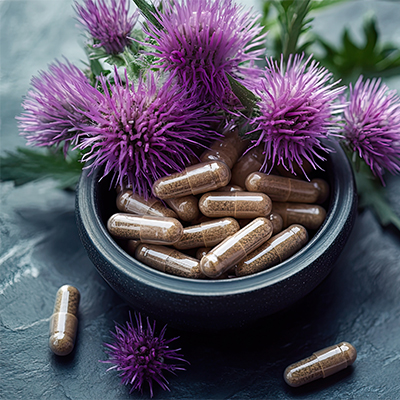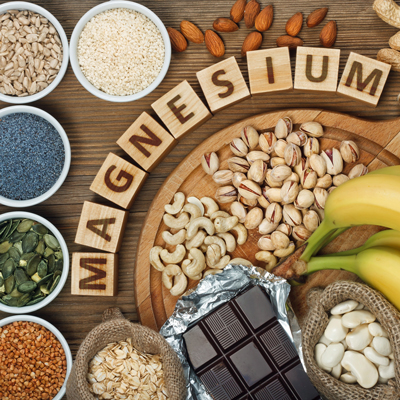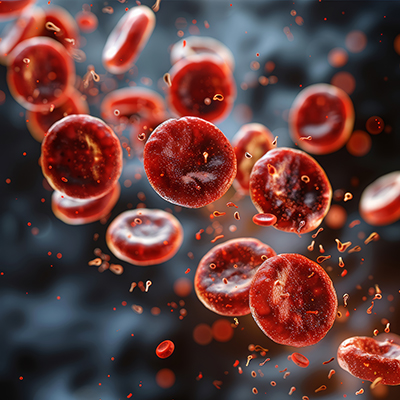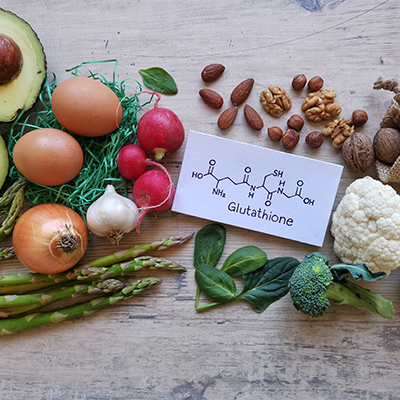Secondary Messengers
All information about "Secondary Messengers" and the related magazine articles can be found here.
Our articles are written clearly and link to scientific studies where relevant. This is how we meet our own standards: we regularly deliver new, high-quality content for you—free of charge, no sign-up required, with the highest possible benefit to you.

Vitamin D3 and K2: the perfect combination for bones and well-being
Find out why vitamin D3 and K2 are so important, especially in the dark season, and how they support your immune system and bone health.
Vitamin D3 helps to banish the winter blues, while vitamin K2 promotes the optimal utilization of calcium. Discover the best food sources and find out when targeted supplementation can be useful.

Stopping cravings: How chromium stabilizes your blood sugar levels
Find out why the trace element chromium can reduce cravings and how it supports your metabolism.
Chromium helps regulate blood sugar levels, helps prevent sudden hunger and promotes long-term wellbeing. Discover the benefits of this important nutrient and find out how you can specifically integrate it into your diet!

Thanks to bitter substances and enzymes, a naturally spring-fit and healthy digestion
Find out how bitter substances and enzymes stimulate your digestion, alleviate digestive problems and gently balance the gastrointestinal tract.
Bitters and enzymes naturally support digestion, relieve bloating and promote general well-being. Discover how you can get off to a fresh and stomach-friendly start with bitter foods, the right diet and high-quality food supplements. For a good gut feeling, day after day.

Clear head, full focus - with ginseng & ginkgo
More concentration, less stress: Natural support for everyday life
Spring brings fresh energy - but sometimes your head feels foggy rather than clear? Ginseng and ginkgo are proven plants that can help boost focus and mental performance. Whether for learning, at work or simply for more mental freshness - discover how this power combination can take your concentration to a new level!

Springtime is liver time! How milk thistle & choline take the strain off your liver
Find out how choline, milk thistle and a conscious diet regenerate your liver and support your metabolism in a natural way.
After months of heavy eating, your liver also needs a break. Choline and milk thistle promote natural detoxification, strengthen the fat metabolism and provide fresh energy for body and mind. Discover how you can make your liver fit for spring with targeted nutrition and vital substances. Scientifically sound and naturally effective.

Iron deficiency? How iron tablets support your vitality
In the cold season, a sufficient iron level is particularly important for energy, blood formation and well-being.
Find out which iron supplements optimally support the body, what you should pay attention to when taking them and how you can specifically prevent iron deficiency. For more strength and vitality in winter!

Strengthening the immune system in the cold season. Magnesium as a key mineral
Find out why magnesium is essential for a strong immune system and how you can optimally cover your requirements.
Especially in the cold season, magnesium supports the body's own defenses, ensures normal muscle function and helps to maintain energy. Discover magnesium-rich foods and practical nutrition tips for resilient health in winter!

Detox cure with L-arginine: Detoxify & recharge your energy
Find out how L-arginine supports your detoxification, boosts your metabolism and improves your athletic performance.
With a 5-day detox plan, you can cleanse your body in a targeted manner, promote blood circulation and increase your well-being. For more energy and an all-round good feeling!

Goodbye winter skin: Radiant skin with biotin, hyaluronic acid & omega-3
Discover the best nutrients for supple and resilient skin in the cold season.
Biotin promotes skin renewal, hyaluronic acid provides deep moisture and omega-3 strengthens the skin's protective barrier. Find out how you can optimally care for your skin and enjoy the winter with a radiant complexion!

Support hormonal balance in spring naturally with monk's pepper and vitamin B6
For a stable cycle and greater well-being
Spring brings change - also for the hormone balance. Monk's pepper and vitamin B6 can help to alleviate PMS symptoms and regulate the menstrual cycle. Discover natural ways for more balance and well-being!

Radiant skin in spring with zinc and OPC
Support skin renewal and bring back the natural glow
Now that spring is here, your skin needs new energy. Find out how you can improve the appearance of your skin with targeted care, zinc and OPC - for a fresh, radiant complexion in spring. Find out more now!

Winter salad with chia: Superfood for the cold season
Discover delicious and nutritious winter salad recipes with chia seeds, turmeric and fresh winter vegetables.
Chia provides valuable omega-3 fatty acids and fiber, while crunchy ingredients ensure enjoyment and variety. Be inspired and enjoy healthy, delicious salads in winter!

More oxygen, more energy: Iron and vitamin C as a spring turbo
Are you already feeling the spring, but not yet at full power?
Maybe your body is missing just the right combination of iron and vitamin C! Find out why these two nutrients can increase your blood oxygen saturation - and how you can regain your vitality in no time at all. Leave fatigue behind and start the warm season with fresh energy!

Activate metabolism for more energy with L-carnitine & omega-3
How to keep your body active without dieting stress
Spring is calling, and with it comes the desire for more energy and a fit body. L-carnitine and omega-3 fatty acids can gently support your metabolism by boosting fat burning and reducing oxidative stress. Find out why now is the perfect time to give your system a boost!

Support for Picky Eaters
When children's picky eating behavior endangers the nutrient supply
Does your child consistently refuse vegetables and only accepts a handful of foods? Here you can find out what is behind the so-called “picky eater syndrome”, why vitamin C is so essential for children's development and which tricks help to defuse picky eating behavior without pressure.

Liver detox with L-glutathione: fresh energy for spring!
Gentle detoxification instead of a crash cure - how L-glutathione supports the liver
The liver filters toxins out of the body and optimally utilizes nutrients. But how can you strengthen it naturally without going on extreme detox cures? Discover here what glutathione has to do with the liver and which simple home remedies can help with “spring cleaning” from the inside.

Winter cabbage & iron: Powerful nutrients for the cold season
Find out how winter cabbage, vitamin C and iron-rich foods support your health and provide your body with optimum care.
Winter cabbage provides valuable iron, which is absorbed even better with vitamin C. Discover delicious recipes and nutrition tips to keep you fit and full of energy throughout the winter!

Protection for your mucous membranes with vitamin B3 (niacin)
Cold air outside, dry heating air inside - this can put a strain on mucous membranes
Find out how micronutrients such as niacin (vitamin B3) can help to support the natural barrier function of the mucous membranes and effectively counteract dryness. An adequate supply of vitamin B3 can help to maintain the well-being of your skin and mucous membranes during the cold season.

Sleeping problems in winter? How magnesium supports your sleep!
How magnesium can contribute to a relaxed night
Winter not only brings cold temperatures, but often also restless nights. Many people toss and turn in bed, struggle with muscle tension or wake up tired in the morning despite getting enough sleep. Magnesium is an essential nutrient that plays a role in muscle relaxation and the sleep-wake rhythm. In this article, you will find out which magnesium supplements are suitable for the evening hours and how you can promote a restful night's sleep with simple routines.

More energy in winter: Ashwagandha as natural support
How the adaptogen can help alleviate the winter blues.
The dark season can not only dampen your mood, but also cause persistent tiredness and listlessness. When energy is lacking and exhaustion remains even after a good night's sleep, the right support for body and mind may be lacking. Ashwagandha is a traditional adaptogen that can help promote inner calm and stabilize the sleep-wake cycle. Find out how you can support your well-being in winter with simple measures and a targeted supply of nutrients.

Constant tiredness despite sleep? How vitamin B complex gives you new energy
More energy, better concentration and less fatigue - this is how B vitamins support your body in winter.
Do you know the feeling of waking up completely exhausted in the morning, even though you've actually had enough sleep? Winter fatigue often robs us of energy, especially in the darker months of the year. The good news is that your body can do more than you think - it just needs the right stimuli! Find out how a vitamin B complex can help you reduce fatigue, boost concentration and get through the winter with more energy. Read now how you can specifically support your energy metabolism!

Strengthen your family with a vitamin boost in winter
Little sunlight, fluctuating temperatures and waves of colds challenge the immune system. Find out how you can get through the cold season healthy and full of energy with vitamin C!
Find out which symptoms indicate a vitamin C deficiency, which foods are real vitamin C bombs and how you can easily integrate your daily intake into your everyday life. Whether for parents, children or older people - with the right nutrients, the whole family can stay strong!

Frankincense: the versatile resin of nature
Discover the history, applications and valuable ingredients of this traditional natural wonder.
Frankincense has inspired people for thousands of years with its fragrance and versatile applications. Whether in ceremonies or as a potential remedy - find out what makes this special resin so unique.

Hashimoto's thyroiditis: Understand, recognize, treat
Find out all about the causes, symptoms and possible treatment approaches for the most common thyroid disease.
Hashimoto's thyroiditis is the most common autoimmune disease of the thyroid gland. Find out how the disease develops, what symptoms can occur and what treatment options are available.
Messenger substances: our body's own communication experts
Imagine entering a huge house with billions of rooms. Employees sit in each of these rooms, constantly communicating with each other to keep the entire building running. This is exactly how you can imagine your body, with the rooms representing the cells and the employees representing the various organs and tissues.
But how exactly does this communication work? This is where the messenger substances come into play – our body's own communication experts.
What are messenger substances?
Messenger substances, also known as chemical messengers, are molecules that transmit information between cells. They are used by living beings for signal transmission or chemical communication (chemocommunication). Messenger substances are fundamentally important for the interaction and communication between cells and tissues within an organism. They are, so to speak, the language with which our body communicates internally. Neurotransmitters, for example, are special messenger substances that play a central role in the nervous system, especially in the brain.
How do messenger substances differ from hormones?
Hormones are a special type of messenger substance that are produced by endocrine glands and released directly into the blood to exert their effect on distant target organs. The main difference lies in their range of action:
- Hormones act systemically throughout the body, while other messenger substances often have a local effect.
- While all hormones are messenger substances, the opposite is not true. There are many messenger substances that are not hormones, such as neurotransmitters in the brain.
- Hormones are released into the blood and can thus act throughout the body, while other messenger substances, such as neurotransmitters, are often only active in limited areas, such as at synapses between nerve cells.
What are the best-known neurotransmitters?
Neurotransmitters are special messenger substances that play a central role in the nervous system, particularly in the brain. They transmit signals between nerve cells and thus control our thoughts, feelings and actions. The best-known neurotransmitters include serotonin, often referred to as the “happy hormone” because it has a strong influence on our mood and well-being. Healthy serotonin levels are crucial for preventing depression and anxiety [1].
Another essential neurotransmitter is dopamine, which is responsible for motivation and reward; a deficiency or imbalance can lead to problems such as listlessness or addictions. Acetylcholine, on the other hand, is important for muscle contraction and cognitive function, especially memory, while GABA, as an inhibitory neurotransmitter, has a calming effect and helps us to cope with stressful situations. The balance of these neurotransmitters is crucial for our mental and physical health and they illustrate how complex our internal communication via chemical agents is organized.
How many messenger substances are there?
It is difficult to say exactly how many messenger substances there are, as research is constantly discovering new ones. In the brain alone, we now know of more than 100 different neurotransmitters. In addition, there are numerous hormones and other signaling molecules in the body. These range from simple amino acids to complex peptides. This diversity enables the human body to react precisely.
From production to effect: the path of a messenger substance
The path of a messenger substance involves several important steps, from its production to its effect in the target cells:
- Production: Messenger substances are produced in special cells.
- Storage: Many messenger substances are stored in vesicles (small bubbles).
- Release: A signal triggers the release of the messenger substance.
- Transport: The messenger substance moves to its target cell.
- Binding: At the target cell, the messenger substance docks onto specific receptors.
- Effect: The target cell reacts to the signal.
- Degradation or reuptake: The messenger substance is degraded or transported back to the cell of origin.
This complex process takes place millions of times in our bodies and enables us to react to our environment, to feel emotions and to adapt our behavior.
What are the tasks of messenger substances in the human body?
Messenger substances control almost every aspect of our lives:
- Metabolism: Hormones such as insulin regulate our energy balance and help control blood sugar levels.
- Emotions: Neurotransmitters such as serotonin influence our mood and play an important role in the development of depression.
- Pain sensation: Endorphins, our body's own painkillers, are released when we feel pain and can lead to a feeling of euphoria.
- Sexuality: Hormones such as testosterone and estrogen control our sexual development and behavior. They influence not only physical characteristics but also libido and fertility.
- Learning and memory: Acetylcholine plays an important role in cognitive processes and is crucial for the formation of new memories.
- Sleep-wake cycle: Melatonin regulates our sleep cycle and is influenced by light.
Messenger substances in nature: from honeybees to insects
Humans are not the only ones to use chemical signals for communication: honeybees, for example, communicate via pheromones to coordinate the swarm. These chemical signals help them find food sources and signal danger.
In many insects, chemical signals play a role in finding a mate. Some butterfly species can detect the pheromones of potential mates over a distance of several kilometers.
Plants also release messenger substances to defend themselves against pathogens. They can even warn neighboring plants when pests attack.
How messenger substances affect our health
It is now clear that messenger substances are important for our health. It is therefore only logical that an imbalance of messenger substances can lead to various illnesses [2]:
- Depression is often associated with a serotonin deficiency. This leads to therapeutic approaches that aim to increase serotonin levels in the brain.
- In Parkinson's disease, dopamine-producing cells die, leading to the characteristic movement disorders.
- Diabetes occurs when the body does not respond properly to the hormone insulin or does not produce enough of it.
- Thyroid disorders are often due to an over- or underproduction of thyroid hormones.
What influence do drugs have on the messenger substances in our body?
Drugs have an extreme effect on our neurochemical processes and influence the finely tuned balance of our neurotransmitters. One example is cocaine, which blocks the reuptake of dopamine. This leads to an intense feeling of happiness, but in the long term it can lead to the exhaustion of the dopamine system.
Opiates work by binding to the same receptors as our body's own endorphins. This binding explains not only their pain-relieving effect but also their high addictive potential. Regular use can cause the body to become accustomed to the drug, requiring ever-higher doses.
Alcohol, on the other hand, has a complex effect because it influences various neurotransmitter systems. For example, it enhances the effect of GABA, which leads to its calming effect. At the same time, it inhibits the activity of glutamate, which increases the dampening effect on the central nervous system.
How are genes and messenger substances related?
Neurotransmitters such as dopamine play a crucial role in signal transmission in the nervous system and can subsequently regulate the activity of certain genes. In extreme cases, this can even influence cognitive performance such as intelligence. Particularly interesting in this context is the epigenetic regulation of genes that code for dopamine receptors.
This regulation can be triggered by various environmental influences, such as stress. Such external factors can cause epigenetic changes in genes via messenger substances and significantly influence their activity [3]. These findings not only help us to understand how our brain works, but also open up new perspectives for understanding and possibly treating neurological and psychiatric disorders in which gene regulation plays an important role.
Messenger Substances and Nutrition
Our diet plays a crucial role in influencing the production and effect of neurotransmitters, which in turn significantly determines our physical and mental well-being and influences how much energy we have. Tryptophan, an essential amino acid and precursor of serotonin, is found in protein-rich foods such as chicken, turkey and nuts. This compound is important because it supports the body's production of the “happy hormone” serotonin, which is crucial for our mood and emotional balance. Omega-3 fatty acids, found primarily in fatty fish such as salmon and mackerel, also promote the function of neurotransmitters and can potentially help prevent depression by supporting brain health.
Equally important is vitamin B6, which is found in foods such as whole grains, bananas and potatoes, as it supports the production of numerous messenger substances and thus strengthens the nervous system. A balanced and nutritious diet thus ensures that the synthesis and effect of messenger substances is optimal, which directly contributes to a better sense of well-being and an overall healthier lifestyle.
What does stress have to do with messenger substances?
Stress activates various messenger substances in our body:
- Cortisol, often referred to as the stress hormone, is released in stressful situations and prepares the body for fight or flight.
- Adrenalin, another stress hormone, increases heart rate and blood pressure and mobilizes energy reserves.
Chronic stress is a challenge for our body, can lead to an imbalance of these messenger substances and impair our health in the long term.
Messenger substances in the course of life
From birth to death, the production and effect of many messenger substances changes:
- The production of growth hormones decreases, which leads to changes in muscle development and fat distribution.
- The levels of sex hormones such as estrogen and testosterone decrease, which triggers the menopause or andropause.
- The sensitivity of receptors can decrease, which affects the effectiveness of messenger substances.
Messenger substances hold our biological system together
Neurotransmitters are the invisible threads that hold our complex biological system together: from controlling our daily functions to our deepest emotions, they are involved in everything. Neurotransmitters are the basis of our lives, our feelings and our experiences. And every day we learn more about the important chemical messengers that make us who we are.
Research into neurotransmitters has revolutionized our understanding of the human body and is constantly opening up new possibilities in medicine and science. From the development of new drugs to insights into the emergence of consciousness, neurotransmitters play a central role in all areas.
Sources:
[1] https://pubmed.ncbi.nlm.nih.gov/31002895/
[2] https://pubmed.ncbi.nlm.nih.gov/37385351/
[3] https://pubmed.ncbi.nlm.nih.gov/19259783/
